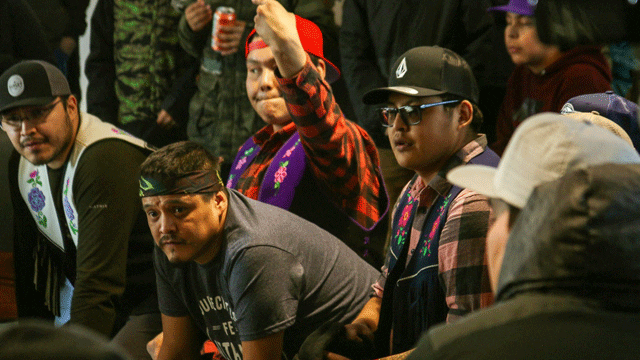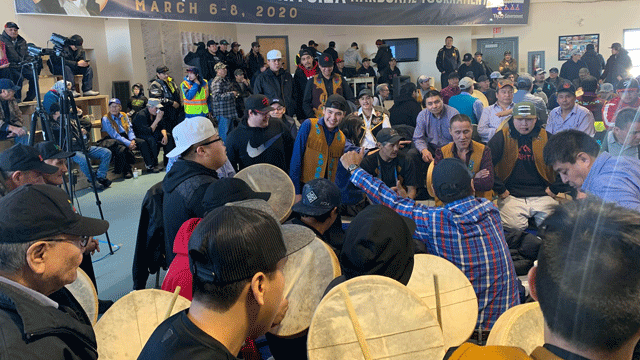
It’s hypnotic as an observer and takes a certain swagger as a player.
Dene near and far travelled the ice road for a three day hand games tournament held in Whati, a community in the Tlicho region of the Northwest Territories. There was only standing room left as the community doubled in population to roughly 1000.
Alfonz Nitsiza, chief of Whati was just ten years old when he started playing the traditional sport.
“We are trying to keep it alive. We have our own local tournament during Christmas and Easter, special holidays and really encourage younger ones with youth tournaments. It is part of our culture, we lost quite a bit in the past so it is good to have it back,” Nitsiza said.
As players guess in which hand the opposing team members are hiding a token, symbolized by sticks, there’s high-energy movements in play to trick the guessers.
This is all fueled by the relentless beat of a drum as beads of sweat roll down.
“You have to really be focused. It is pretty much a guessing game but you get good at it because there is expressions on people’s faces you can tell,” he said.

The stakes are high with a $100,000 prize to the winning team. It’s not about the purse, but the rules based on spiritual protocol that root the players in the game.
Tony Rabesca, cultural practice manager with the Tlicho Government, cited patience as a gift given to players when they embrace the spirit of the game, shooting down opponents and learning to become leaders for their team.
“The thing that’s important about the hand games is we continue to keep the friendship, we shake hands and strengthen the unity among the nation,” Rabesca said.
The games have enjoyed a recent revival. In the 1990s, youth participation was low. Rabesca helped organize a workshop to teach the history of the games and launch a $15,000 tournament.
It worked. Since 2005 membership for tournaments has been on the upswing.
“We are finding that the cultural values and beliefs we need to start bringing that back. There is a traditional story behind the game and there is also traditional protocol. Sometimes we don’t see it as important but it has significance in the games that we play,” he said.
Like any event in the North, dry communities have to deal with the surge of drugs and alcohol.
Days before the tournament, RCMP seized crack cocaine and charged a local with possession with intent to traffic.
“We don’t want any drugs or alcohol during the events. One thing I know, with hand games the traditional games people respect it, won’t come into the building under the influence of drugs and alcohol,” Nitzisa said.

(Drummers keep the beat, sometimes drumming for long periods of time as hand games can go for hours. Photo: Charlotte Morritt-Jacobs/APTN)
But the exposure to outside influence is something the community has been preparing for.
Whati is scheduled to have a permanent road open to the public by November 2021, linking up to Behchoko to travel to the capitol of Yellowknife or to go south to Alberta.
A round-trip by air is $500 to fly to Yellowknife and the ice road is only open a few weeks of the year. According to Chief Nitsiza, investments in tourism infrastructure is a priority before the road opens. Whati is known for its crystal clear waters and trout fishing (Lac La Martre being the third largest in the territory).
“The changes may mean fear for community members. We have been talking in the community about how to mitigate the impact with the concern of drugs and alcohol, but it will be good for the cost of living and safety, with the only way we travel out of here by plane,” he said.
Along with lowering the cost of living it will also allow the community to share the traditional sport.
“You feel excited when you are here, you feel uplifted because of the beat of the drum, the pounding and the games,” Nitsiza said.










